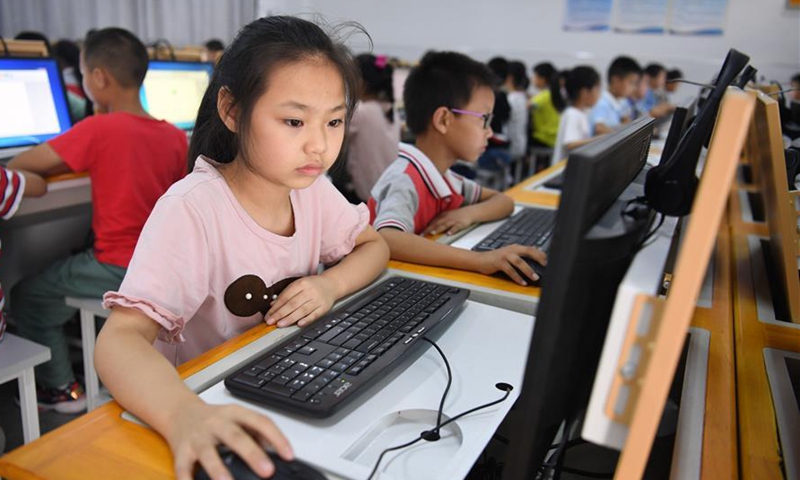
Students have computer class at the Jinzhai County primary school in Jinzhai, East China's Anhui Province, on September 3, 2019. Photo: Xinhua
The Ministry of Education (MOE) has issued provisional measures for imposing administrative penalties for illegal off-campus tutoring. The penalty provisions came about two years after China's most stringent measures to relieve students' burden, dubbed the "double reduction."
The aim is to strengthen the regulation of off-campus tutoring and make it a useful supplement to school education. This penalty provision will restrict off-campus tutoring violations, in order to create a good environment for the growth of students, according to the MOE.
The measures set out the general requirements for administrative penalties for illegal off-campus tutoring operated by any person or organization that is offered to preschool children over 3 years of age, and primary and secondary school students, according to the MOE.
It stipulates that administrative penalties shall be imposed by the competent authorities and makes provisions for the jurisdiction of offline and online off-campus tutoring.
The administrative penalties include warnings, fines, confiscation of illegal income, revocation of licenses, and restrictions on practicing. The maximum fine is 100,000 yuan ($13,712).
Some violations will result in heavier penalties, including off-campus tutoring offenses that are repeated within two years after the previous offense was dealt with, as well as off-campus tutoring by teachers at primary or secondary schools.
At the same time, off-campus tutoring institutions organizing unauthorized social competitions for pre-school children, primary and secondary school students will also be subject to administrative penalties.
The measures also require authorities in charge of off-campus tutoring to set up a law enforcement monitoring system to strengthen supervision of abuses and violations during the penalty process.
The measures will come into effect on October 15.
The slew of measures to ease the burden and anxiety for students and parents alike were introduced in July 2021. Dubbed the "double reduction policy," the aim is a reduction in homework and in time spent in extra-curricular classes or after-school private tutoring.
In the two years since the implementation of the "double reduction" policy, the governance of off-campus tutoring has achieved some progress, but problems such as hidden organization of off-campus tutoring still exist. There is an urgent need to improve the legal system for off-campus tutoring to ensure that the "double-reduction" policy continues to be effective, an MOE spokesperson said Tuesday.
At the same time, the general public has also called for the introduction of administrative penalties in the field of off-campus tutoring as soon as possible, to strengthen and standardize the work of administrative penalties for off-campus tutoring, and to deepen the governance of off-campus tutoring through the rule of law, according to the spokesperson.
To improve the quality of the legislation, the MOE set up a special working team and conducted field research in many places, while openly soliciting opinions from the community, the spokesperson said.
The MOE also emphasized that people who have been deprived of their political rights or who have been sentenced to a prison term for intentional crimes are not allowed to be employed as off-campus tutoring practitioners.
Earlier in August, New Oriental, a well-known after-school tutoring service, was accused by a social media influencer of violating the "double reduction" policy, prompting an investigation by the Hangzhou educational authorities. Operations at all of the company's branches were later suspended, according to media reports.
Over the past two years, the effectiveness of the "double reduction" policy has been remarkable, especially in the management of off-campus tutoring services. But reducing the educational burden is also a long-term battle, observers noted. In addition to the introduction of applicable penalties, various departments should also be committed to continuously expanding and optimizing after-school services.
Relevant departments should take the "double reduction" as an opportunity to push the overall reform of basic education, promote the return of education to the essence of nurturing, build comprehensive development of the education system, promote educational fairness, and reshape the education ecology in China, an editorial in Chinese newspaper Shaanxi Daily said on Tuesday.
Global Times




